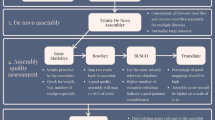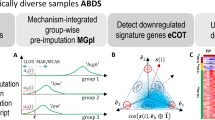Abstract
Background.
The complexity and inter-related nature of biological data poses a difficult challenge for data and tool integration. There has been a proliferation of interoperability standards and projects over the past decade, none of which has been widely adopted by the bioinformatics community. Recent attempts have focused on the use of semantics to assist integration, and Semantic Web technologies are being welcomed by this community.Description.SADI – Semantic Automated Discovery and Integration – is a lightweight set of fully standards-compliant Semantic Web service design patterns that simplify the publication of services of the type commonly found in bioinformatics and other scientific domains. Using Semantic Web technologies at every level of the Web services “stack”, SADI services consume and produce instances of OWL Classes following a small number of very straightforward best-practices. In addition, we provide codebases that support these best-practices, and plug-in tools to popular developer and client software that dramatically simplify deployment of services by providers, and the discovery and utilization of those services by their consumers.
Conclusions.
SADI Services are fully compliant with, and utilize only foundational Web standards; are simple to create and maintain for service providers; and can be discovered and utilized in a very intuitive way by biologist end-users. In addition, the SADI design patterns significantly improve the ability of software to automatically discover appropriate services based on user-needs, and automatically chain these into complex analytical workflows. We show that, when resources are exposed through SADI, data compliant with a given ontological model can be automatically gathered, or generated, from these distributed, non-coordinating resources - a behavior we have not observed in any other Semantic system. Finally, we show that, using SADI, data dynamically generated from Web services can be explored in a manner very similar to data housed in static triple-stores, thus facilitating the intersection of Web services and Semantic Web technologies.
Similar content being viewed by others
Article PDF
Author information
Authors and Affiliations
Corresponding author
Rights and permissions
About this article
Cite this article
Wilkinson, M., Vandervalk, B. & McCarthy, L. The Semantic Automated Discovery and Integration (SADI) Web service Design-Pattern, API and Reference Implementation. Nat Prec (2011). https://doi.org/10.1038/npre.2011.6550.1
Received:
Accepted:
Published:
DOI: https://doi.org/10.1038/npre.2011.6550.1



